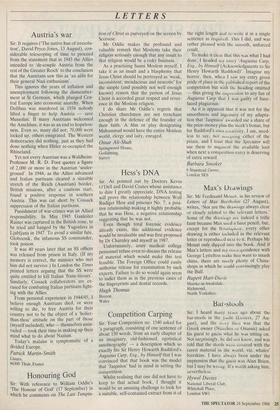LETTERS Austria's war
Sir: It requires (The native hue of irresolu- tion', David Pryce-Jones, 13 August), con- siderable telescoping of time to proceed from the statement that in 1943 the Allies intended to 'de-couple Austria from the rest of the Greater Reich' to the conclusion that the Austrians saw this as 'an alibi for their general Nazi enthusiasm'.
This ignores the years of inflation and unemployment following the dismember- ment at St Germain, which plunged Cen- tral Europe into economic anarchy. When Dollfuss was murdered in 1934 nobody lifted a finger to help Austria — save Mussolini. If many Austrians welcomed the Anschluss, it was as an end to hopeless- ness. Even so, many did not; 70,000 were locked up, others emigrated. The Western democracies did nothing, just as they had done nothing when Hitler re-occupied the Rhineland.
Yet not every Austrian was a Waldheim. Professor M. R. D. Foot quotes a figure of 2,000 or more in the Austrian 'under- ground'. In 1944, as the Allies advanced and Italian partisans cleared a sizeable stretch of the Reich (Austrian) border, British missions, after a cautious start, found a positive response in southern Austria. This was cut short by 'Cossack suppression of the Italian partisans.
Punishment of war-crimes was an Allied responsibility. In May 1945 Gauleiter Rainer was captured in the British zone, to be tried and hanged by the Yugoslays in Ljubljana in 1947. To avoid a similar fate, Globocnik, the infamous SS commander, took poison. It was 40 years later that an SS officer was released from prison in Italy. (If my memory is correct, the minister who met him did not survive.) In London the Times printed letters arguing that the SS were quite entitled to kill Italian 'franc-tireurs'. Similarly, Cossack collaborators are ex- cused for combating Italian partisans fight- ing with the Allies. From personal experience in 1944/45, I believe enough Austrians died, or were willing to die, to free Austria for their country not to be the object of a 'holier- than-thou' attitude on the part of those (myself included), who — themselves unin- vaded — took their time in making up their mind what to do about Nazism.
Today's malaise is symptomatic of a divided Europe.
Patrick Martin-Smith
Llauro, 66300 Thuir,France






























































 Previous page
Previous page